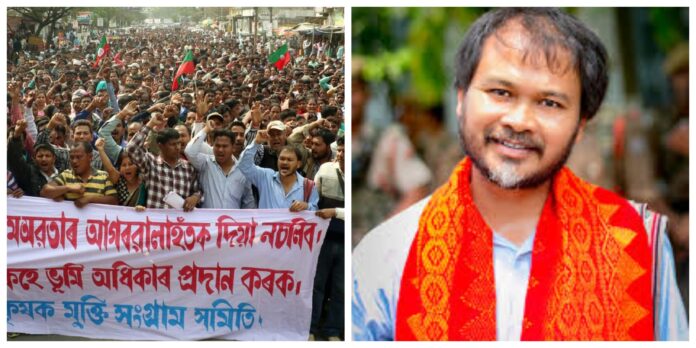On the evening of December 12, 2019, soon after addressing a crowd of around a thousand protestors, Akhil Gogoi, leader of Krishak Mukti Sangram Samiti (KMSS) was arrested in Jorhat, Assam. KMSS is a renowned peasant organization in the region. It has been eight months of his wrongful incarceration with one after another botched up charge used against him, with no respite even after he was infected with the Coronavirus.
On December 13, a sub-inspector lodged a complaint in Guwahati claiming that Akhil Gogoi had “secretly merged” KMSS with a Maoist outfit called Revolutionary Communist Centre in 2009. The FIR alleged that after merging the two, Gogoi had arranged several meetings and “visited several parts of India including Delhi to further the activities of the proscribed organization”. The FIR further states, “As part of the larger conspiracy of CPI (Maoist), he and others have knowingly abetted, conspired, advocated, incited the acts preparatory to the commission of terrorist acts”.
The NIA registered a case against Akhil Gogoi on December 14, 2019, under IPC Sc.120B/124-A/153-B and UA (P) Act, 1967 Sec. 18/39. The charges included that KMSS had used the passage of the CAA in the parliament as an opportunity to create enmity between different groups on the grounds of religion, race, place of birth, residence, language “and done acts prejudicial to maintenance of harmony, using visible representations and spoken words, thus endangering the security and sovereignty of the state which is prejudicial to national integration.”
Gogoi was consequently sent to NIA custody for 10 days in Delhi and is lodged in Guwahati Central Jail since December 26, 2019. Almost all the top leaders of KMSS were put behind bars within a month, with the UAPA was slapped against four of them.
This however is not the first time that Gogoi has faced such a series of fabricated charges against him only to prolong custody and thereby break the momentum of any widely popular movement. On October 2, 2016, when protests against CAB began gaining impetus with Akhil Gogoi at the fore, Gogoi was picked up from Gandhibasti, Guwahati in connection with an earlier case of inciting protestors during an eviction drive against illegal settlers in and around the Kaziranga National Park. He was later sent to Lakhimpur Jail. He was remanded to a 14 days judicial custody on November 2, 2016, only to be re-arrested in connection with a case from 2006, and then again arrested, while in Golaghat Jail, for another case from 2015. He was released after 78 days of incarceration, but was arrested again on September 25, 2017, and slapped with the NSA.
If one goes through this maze of arrests and re-arrests, one doesn’t need to be a legal expert to realize that this is a gross travesty of justice systemically carried out by the BJP government in Assam to muzzle voices of dissent.
Akhil Gogoi’s journey of activism has never been a smooth one. It was not the mainstream regional parties, but Akhil Gogoi led KMSS which had been a strong opposition to the Congress government in Assam. As an RTI activist, Akhil Gogoi exposed scams and corruption by the then government and simultaneously led many mass movements against forceful evictions, corporate land grab, construction of big dams, along with protests for land settlement and forest rights of the local populace.
Ever since its inception in 2005 after actively being part of an anti-eviction movement in Doyang and Tengani, KMSS has stood by the struggles of the working class and peasants of Assam, fighting for their rights, resisting state exploitation and successfully intervening in inhumane and communally motivated multiple eviction drives. As an organization for the peasants and indigenous people, ensuring land rights of the Assamese people of all ethnic groups and communities demanded priority. The question of land cannot be overlooked for the region when one is trying to understand conflict and insecurities that unfolded over time. Eventually, they devised a well thought out Land Policy and continued the movement to guarantee land rights to the working people of Assam. Their efforts could secure land pattas for around 20000 tribal villagers so far. KMSS had also initiated several movements against corrupt village panchayats and sent many village heads and district officials to jail.
After an abandoned oil well at Dikom caught fire in 2005, it took 45 days to bring the situation under control, and in November 2006, KMSS declared its opposition to the seismic survey for locating oil reserves in the Brahmaputra river bed undertaken by Oil India Limited (OIL). KMSS maintained that oil exploration in the highly eco-sensitive Dibru Saikhowa National Park area could be a serious threat to the local ecology and population. Unfortunately, as apprehended, the Baghjan oil rig recently caught fire causing enormous and irreparable damage to the lives of people, livestock, and the surrounding ecosystem.
KMSS asserts that its main aim is to fight the neo-colonial capitalist exploitation of the resources that belong to the people of Assam. Its opposition to big river dams, privatization of water, river linking projects, Special Economic Zone (SEZ), etc is part of its ideological fight against the neo-colonial agenda of the big capital.
KMSS leaders successfully launched a movement against unregulated Micro Finance institutions which had proved to be an affliction and had cost the lives and property of many. The schemes would mostly be availed by women as economic support, and thereby the protests demanding better control of these institutions by the Government saw huge participation of women in villages and small towns across Assam.
Ranging from the Assam Public Service Commission corruption scam in which the chairman was finally sent behind bars, to exposing many powerful politicians involved in scams, including Himanta Biswa Sarma, through RTI, Akhil Gogoi had been an unapologetic and uncompromising dissident. The NIA, while conducting raids at his house after his recent arrest, was looking for many such files which names political leaders and business tycoons.
Gogoi caught national attention with the successful and famous campaign against the construction of big dams, precisely the Lower Subansiri Dam, in 2007. The NHPC’s 2000 MW Lower Subansiri Dam work has been stalled since 2011, because of protests by KMSS. KMSS had also been opposing the unlawful construction of toll gates and exposing coal syndicate in the state.
After the BJP introduced the Citizenship (Amendment) Bill, 2016 to further their Hindu Rashtra project, under the abled leadership of Akhil Gogoi the entire state of Assam rose in unison against the Bill, with fervent protests starting in 2016. This was because the historical questions of nationality and migration in the Northeastern states have not been resolved, and the current regime was hell-bent on removing whatever little formal-level autonomy any indigenous community had, an issue that does not seem to concern the mainland India.
Gogoi wrote while he was in Golaghat Central Jail in 2016, “The issue of granting citizenship to Hindu Bangladeshi’s cannot be seen from the vote bank perspectives of Congress and the BJP . . . Even before independence, the RSS or the Sangh Parivar have been devoted to making India a ‘Hindu Nation’. The ‘Hindu Nation’ of the RSS is not only a mere Hindu nation, their Hindu nation is a capitalist state erected on the base of Hindutva which will have an imperialist character, i.e., it will have a goal of oppressing the small neighboring nation-states. Although the base of the state is capitalist, it is always controlled by the Hindutva superstructure. Their aim is to build an India which is Hindutva from outside, with a capitalist, free, neo-liberal economy from the inside (this Hindutva is not of the Dalits, tribals, so-called lower classes and the poor, this is casteist Hindutva controlled by the upper castes) . . . They are trying to destroy the independent and distinctive character of Assamese community and build it up as an imitative community of an Indian character so that it will be easier to loot the market of crude oil, coal, limestone, water, tea, as well as to enslave a historical nationalist force . . . The Assamese people will be made to fight among themselves, and then our national goal would be to fight among ourselves in Assam.”
What followed were massive and continued protests across the state and in Delhi having dialogues with Rajya Sabha members, led by KMSS because of which CAB could not be passed in the parliament in December 2018. But the BJP government, after coming to power for the second term in 2019, adamantly passed the CAB and made it an act which resulted in new and massive waves of protests across Assam and the country. As the government continued to hound democratic activists, KMSS leadership was targeted and put behind bars.
The NIA had failed to file a charge sheet within mandatory 90 days, which warranted Akhil Gogoi’s release but he was immediately arrested for other cases, transferred from one jail to another within the state. Gogoi had secured bail in all the cases, but to maintain his custody, frivolous charges were pressed again. The most recent one filed by the NIA on May 28, 2020 accuses Gogoi of torching a Circle office, a post office, and a Bank at Chabua on October 12, 2020 and another one accuses him of breaking a police officer’s nose by pelting stones.
On July 7, 2020, Gogoi was detected COVID positive, and massive protests rocked the state of Assam demanding his release and immediate medical attention. Though he was treated at the hospital, his bail was again rejected for the Chabua case and he continues to be in prison.
The tortures and killings in police and military custody continue to haunt the people of the state of Assam. By continuing to raise these concerns, Akhil Gogoi and his associates, have ironically become the state’s enemy kept behind bars.




























[…] Read about: Why The State is So Afraid of Akhil Gogoi? […]
[…] Also Read: Why The State is So Afraid of Akhil Gogoi? […]